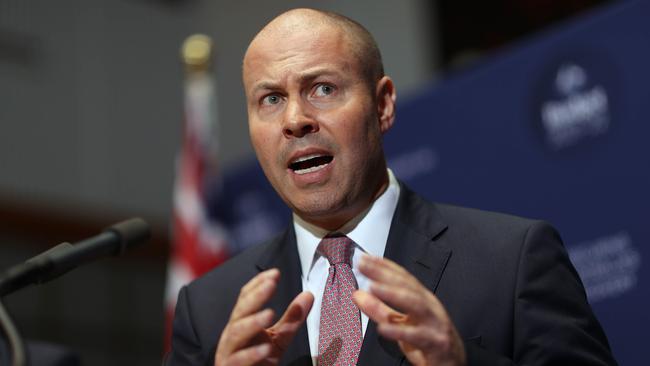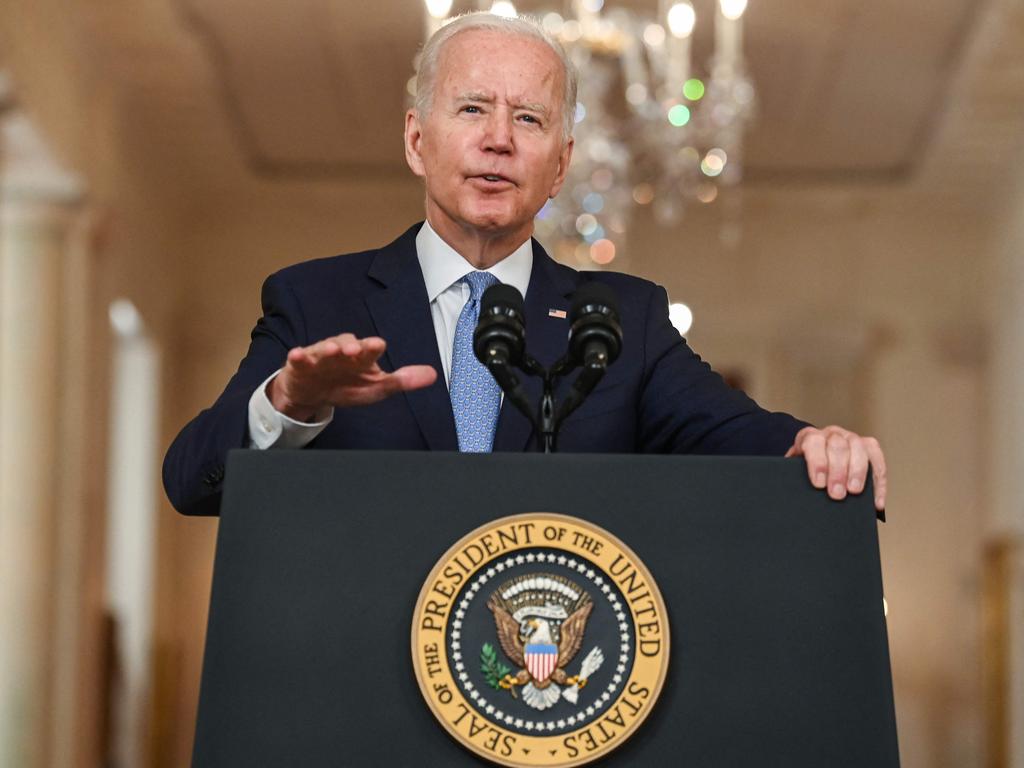No retreat in face of China threat: Josh Frydenberg
Australia must embrace a strategy to make the economy and business more resilient to Chinese coercion, Josh Frydenberg says.

Josh Frydenberg says a more aggressive Beijing means Australia must embrace a new national strategy to make the economy and business more resilient to Chinese economic coercion in a new era of strategic competition.
The new approach, dubbed “China-plus”, is aimed at securing a long-term adjustment in which businesses diversify their markets, buttress their supply chains and reduce any over-reliance on the nation’s largest trading partner.
In a speech to the ANU Crawford Leadership Forum on Monday, the Treasurer will say the world has been convulsed by “the return of strategic competition” that he describes as a “defining feature of the economic and security landscape”.
In a draft version of his address, Mr Frydenberg said the rise of China as an economic superpower had “helped to lift more than 800 million people out of poverty” and was “a major contributor to global economic growth and prosperity”.
“But more recently, it has also been defined by another feature,” he said. “A more confident and assertive China. A China that is willing to use its economic weight as a source of political pressure. It offers economic ‘carrots’ through initiatives such as the Belt and Road. And it threatens economic consequences for perceived misdeeds.”
Drawing a parallel with the strategic competition during the Cold War, Mr Frydenberg said there were “important differences this time around” because of how deeply China was integrated within the global economy and trading system.
“During the Cold War, the Soviet Union was largely cut off from the rest of the world,” he said. “It did not trade or invest much outside of its sphere of influence.
“Contrast this to the present day. The IMF estimates that China’s share of global GDP will increase to 18.8 per cent in 2021, up from just 7.7 per cent in 2001.
“Almost 130 countries now have China as their largest trading partner. This combination of economic weight, global integration and assertiveness poses new and significant challenges for many countries around the world.”
Mr Frydenberg’s new “China-plus” strategy would see business leaders working harder to diversify away from the Chinese market, investing in cyber security and developing more secure supply chains.
While he said China had “recently sought to target Australia’s economy”, he provided an assurance the nation would always remain “steadfast in defending our sovereignty and our core values”.
“We have faced increasing pressure to compromise on our core values. And when we have stood firm, as we always will, we have been subjected to economic coercion,” Mr Frydenberg said.
“Our task is to prepare for and manage this competition. And in this new world, economic resilience is key. Key to our strategic interests and key to our economic interests … our economic and security interests increasingly overlap.”
Local exporters of wine, seafood, barley and coal have already suffered the partial or complete loss of their major international markets after China cited a list of 14 “so-called” grievances with Australia to justify trade sanctions.
The complaints ranged from Australia’s call for an international inquiry into the origins of the Covid-19 virus to the tightening of the foreign investment regime that Beijing believes unfairly targeted Chinese companies.
But Mr Frydenberg said that exporters had proved “remarkably resilient” and that, “despite China’s wide-ranging actions, our economy has continued to perform very strongly”.
“Many of the firms and industries targeted by China’s trade restrictions have also been successful in re-directing goods to other export destinations,” Mr Frydenberg said.
Australia’s trade surplus hit a record $28.9bn in the June quarter, boosted by record commodity prices including iron ore, for which China remains the No. 1 customer.
Mr Frydenberg also pointed to Australia’s unemployment rate, which dropped to 4.6 per cent in July – the lowest level in about 13 years – albeit ahead of the devastating impact of the Delta lockdowns in NSW and Victoria.
“A strong economy is the foundation of a country’s resilience and strategic weight. And our strong and flexibly economy has served us well,” he said.
Of the goods targeted by trade actions, Australia’s exports to China are estimated to have fallen about $5.4bn over the year to the June quarter. Over the same period, however, exports of those goods to the rest of the world have increased $4.4bn.
The Treasurer said he was “not downplaying the impact of China’s actions”, arguing that Beijing’s trade actions did “carry a cost” to both nations.
“They have hurt specific industries and regions, significantly in some cases. Nevertheless, the overall impact on our economy has, to date, been relatively modest. This is perhaps surprising to many,” he said.
But Mr Frydenberg said the trade measures also “rob Chinese consumers of premium Australian wine, seafood and other goods”.
“We would both be better off if markets were allowed to operate freely,” he said.
Mr Frydenberg said Australian businesses would “need to enhance their own resilience”.
“Many have worked hard to access the lucrative Chinese market. This has brought great benefits to them and to Australia overall. And they should continue to pursue these opportunities where they can,” he said.
“But going forward, businesses also need to be aware that the world has changed. And that this creates greater uncertainty and risk.”
“In this respect, they should always be looking to diversify their markets, and not overly rely on any one country. Essentially adopting a ‘China plus’ strategy.
“And in the same way that governments are investing in economic resilience. So too, should Australian businesses – from cyber risks to supply chains and everything in between.”
Mr Frydenberg said the government was taking steps to bolster economic resilience and business needed to develop their own long-term plans.
“This is a responsibility we all need to take very seriously,” he said.
The Treasurer also said that Australia would “always choose partnerships ahead of conflict, wherever we can”.
“However, heightened strategic competition is the new reality we face, now and likely into the future,” he said.
“Our task is to prepare for and manage this competition. And in this new world, economic resilience is key – key to our strategic interests and key to our economic interests.”








To join the conversation, please log in. Don't have an account? Register
Join the conversation, you are commenting as Logout